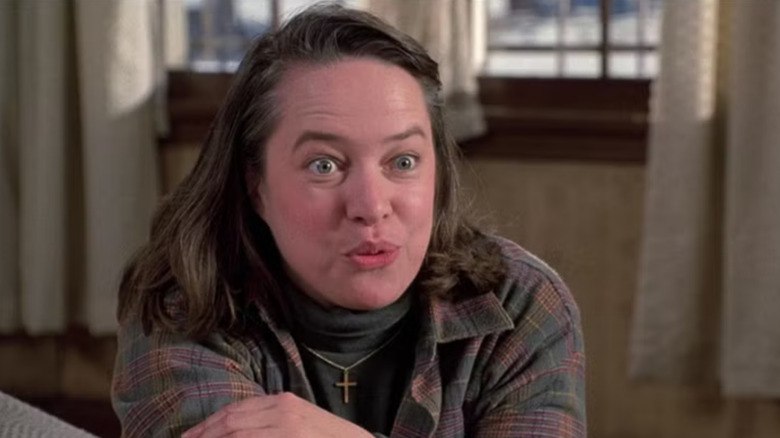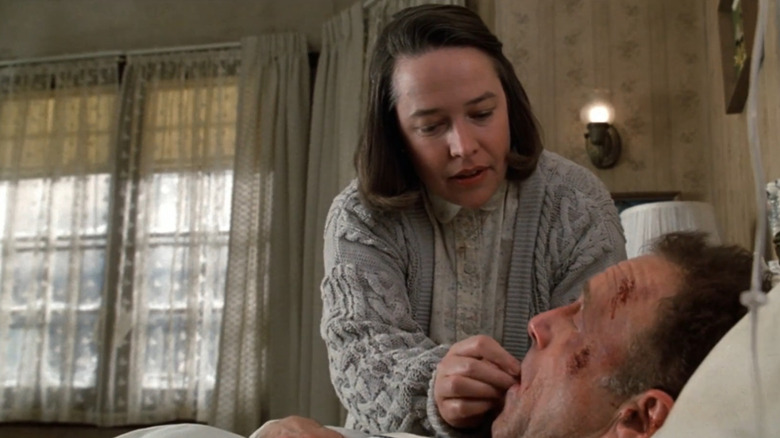How Kathy Bates Proved Misery's Director Wrong With Her Stephen King Role
If there's one thing we know about the Oscars, it's that they have a bias against horror. Although we here at /Film love horror for how subversive and fun the genre can be — and how it's one of the only genres that consistently seems to turn a profit — the Oscar voters seem to see it as too "unrefined" to take seriously. There are too many memorable horror performances that never got a nomination, just as there are too many talented horror directors and screenwriters who never got their due.
That's why nobody expected Kathy Bates to win an Oscar for her performance in the 1990 film "Misery." Although her portrayal of the obsessive, vindictive Annie Wilkes is still beloved even 35 years later, its horror movie context still made it a long shot as far as the Academy was concerned. That's why the movie's director, Rob Reiner, had no faith in Bates winning Best Actress for the role.
At the 2025 TCM Classic Film Festival, Bates and Reiner reminisced about her surprise Oscar win. Bates told Reiner, "You said, 'You can campaign, but you're not gonna get it.' You said because it's a horror movie and not likely ... then that night I just remember you standing there and you were like [fist bumps] 'Yeah, yeah.'"
"Because you deserved it," Reiner told her. "It's an amazing performance." Later at the panel, Reiner recalled knowing Bates was a great actress from the moment she auditioned, and how he was worried about Bates potentially letting her Wilkes performance bleed into the rest of her life:
"Kathy is such a dedicated actress, and she was so focused on wanting to make this work, she would take the character home with her a lot of times. [...] I said to her, 'You have to trust that you have one of the greatest acting instruments of all time and you can leave that character here at the studio and go home and be yourself, and don't be worried that you won't be able to pick it back up again.'"
Bates' win was unique in more ways than one
For the Best Actress award, Kathy Bates was running against Anjelica Huston for "The Grifters," Julia Roberts for "Pretty Woman," Meryl Streep for "Postcards from the Edge," and Joanne Woodward for "Mr. & Mrs. Bridge." As the Herald and Review remarked at the time, "Kathy Bates, the demented recluse in 'Misery,' was perhaps the night's biggest surprise. Most observers had predicted that either Anjelica Huston or Joanne Woodward would walk off with the best actress prize."
People underestimated Bates not just because she was acting in horror, but because she didn't have the conventional body type associated with most popular Hollywood actresses. It's something The Olympian remarked on in their coverage of her win, noting, "In another tacit acknowledgment that Hollywood often overlooks the unconventional, the Best Actress award went to Kathy Bates, a veteran stage actress who has regularly been passed over for choice film roles on the grounds that she was too old, too heavy or not pretty enough to be a leading lady."
But although widely seen as an underdog, Bates' win was not mocked in the same way that other controversial Best Actress wins have been over the years. Where Marissa Tomei was treated cruelly by the press when she (correctly!) won for "My Cousin Vinny" a few years later, most critics of the time understood that Bates was a reasonable choice. As the Daily Sentiment wrote about the ceremony the next day, "Surprises? Kathy Bates seems the only one, though in retrospect, the choice is a natural. Her part as the crazed literary fan in 'Misery' was so much more flamboyant than the understated performances of leading contenders Anjelica Huston and Joanne Woodward."
If there's one advantage horror has at award ceremonies, it's that the genre gives its actors more chances to go big with their performance. There are few roles more attention-grabbing than an unhinged woman with a sledgehammer, and Bates nailed it from start to finish. "Misery" isn't the only horror film to win an Oscar, but it might be the one that earned it the most.

